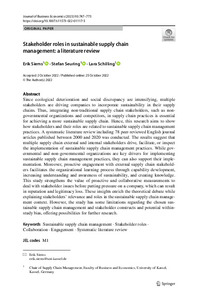| dc.date.accessioned | 2023-05-08T10:05:10Z | |
| dc.date.available | 2023-05-08T10:05:10Z | |
| dc.date.issued | 2022-10-25 | |
| dc.identifier | doi:10.17170/kobra-202305057954 | |
| dc.identifier.uri | http://hdl.handle.net/123456789/14666 | |
| dc.description.sponsorship | Gefördert im Rahmen des Projekts DEAL | ger |
| dc.language.iso | eng | eng |
| dc.rights | Namensnennung 4.0 International | * |
| dc.rights.uri | http://creativecommons.org/licenses/by/4.0/ | * |
| dc.subject | sustainable supply chain management | eng |
| dc.subject | stakeholder roles | eng |
| dc.subject | collaboration | eng |
| dc.subject | engagement | eng |
| dc.subject | systematic literature review | eng |
| dc.subject.ddc | 330 | |
| dc.title | Stakeholder roles in sustainable supply chain management: a literature review | eng |
| dc.type | Aufsatz | |
| dcterms.abstract | Since ecological deterioration and social discrepancy are intensifying, multiple stakeholders are driving companies to incorporate sustainability in their supply chains. Thus, integrating non-traditional supply chain stakeholders, such as non-governmental organizations and competitors, in supply chain practices is essential for achieving a more sustainable supply chain. Hence, this research aims to show how stakeholders and their roles are related to sustainable supply chain management practices. A systematic literature review including 78 peer-reviewed English journal articles published between 2000 and 2020 was conducted. The results suggest that multiple supply chain external and internal stakeholders drive, facilitate, or inspect the implementation of sustainable supply chain management practices. While governmental and non-governmental organizations are key drivers for implementing sustainable supply chain management practices, they can also support their implementation. Moreover, proactive engagement with external supply chain stakeholders facilitates the organizational learning process through capability development, increasing understanding and awareness of sustainability, and creating knowledge. This study strengthens the value of proactive and collaborative measurements to deal with stakeholder issues before putting pressure on a company, which can result in reputation and legitimacy loss. These insights enrich the theoretical debate while explaining stakeholders’ relevance and roles in the sustainable supply chain management context. However, the study has some limitations regarding the chosen sustainable supply chain management and stakeholder constructs and potential within-study bias, offering possibilities for further research. | eng |
| dcterms.accessRights | open access | |
| dcterms.creator | Siems, Erik | |
| dcterms.creator | Seuring, Stefan | |
| dcterms.creator | Schilling, Lara | |
| dc.relation.doi | doi:10.1007/s11573-022-01117-5 | |
| dc.subject.swd | Supply Chain Management | ger |
| dc.subject.swd | Nachhaltigkeit | ger |
| dc.subject.swd | Stakeholder | ger |
| dc.subject.swd | Kollaboration | ger |
| dc.subject.swd | Engagement | ger |
| dc.type.version | publishedVersion | |
| dcterms.source.identifier | eissn:1861-8928 | |
| dcterms.source.issue | Issue 4 | |
| dcterms.source.journal | Journal of Business Economics (JBE) | eng |
| dcterms.source.pageinfo | 747-775 | |
| dcterms.source.volume | Volume 93 | |
| kup.iskup | false | |


